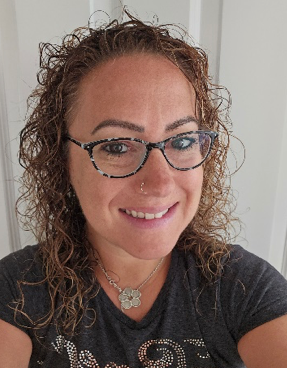Daniela, ward assistant, now a midwifery student 
- How did the volunteering help you find work/course/apprenticeship? – I started my journey towards becoming a midwife and part of this journey required some degree of volunteering within the NHS services. I chose East Surrey Hospital as I always had the best care here and wanted to return the favour by helping alleviate some of the workload they are facing. When I got accepted onto my university course, I carried on volunteering as I loved it so much.
- How did you find volunteering? – I was lucky enough to be placed on the antenatal day unit after having my interview. I loved greeting patients that walked through the door and trying to help with any anxiety they were feeling. I also loved helping the midwives with any admin duties that was within my remit. I felt like part of the team.
- What was the best thing about volunteering? Knowing that I had made a small difference in the midwives’ workload and always being thanked for my help by taking time out to help them. They were always appreciative. I made some friends along the way too.
️ - Is there anything else you can think of that prospective volunteers might find useful to know? Just know that however small it may feel, you are making a huge difference and they really do appreciate it.
James, admin volunteer, now an apprentice 
How did the volunteering help you find work/course/apprenticeship?
Volunteering gave me the much-desired skill of real-world work experience. A large majority of apprenticeship providers look for a level of work experience due to the requirement of being a full-time employee while undertaking an apprenticeship and volunteering gave me the much-needed work experience to ensure that my application was successful.
How did you find volunteering?
My overall experience of volunteering has been amazing. In my role as an administrative assistant, I have been fortunate enough to work with so many kind and enthusiastic people both within the medical resourcing team where I work and while meeting other volunteers through different volunteering related events.
What was the best thing about volunteering?
The best thing about volunteering for both East Surrey Hospital and the NHS is that I know I am supporting the amazing work that the NHS does in both the UK and the community that surrounds East Surrey Hospital.
Is there anything else you can think of that prospective volunteers might find useful to know?
Overall when applying to become a volunteer create a clear goal of what you want to gain from volunteering. For me, my goal was to gain the key workplace skills that are required for having a job within a team-based environment. Having these goals ensures that you have a clear understanding of your development throughout your whole volunteering and can result in a significant amount of personal development.
Jay Started as a volunteer in pharmacy and now is employed as a bank Pharmacy assistant
How did the volunteering help you find work/course/apprenticeship? The volunteering helped me find work by allowing me to get to know the pharmacy department. It also gave the staff time to know me and my work ethic, and that I am, trustworthy and a good person to employ as bank pharmacy assistant.
How did you find volunteering? I found volunteering quite interesting as it allowed me to see all of the steps involved in delivering the medication to the wards and finding new wards.
What was the best thing about volunteering? The best part about volunteering is the fact that you know what you’re doing is helping other people whether its staff or patients.
Is there anything else you can think of that prospective volunteers might find useful to know? for volunteers in pharmacy there is a map of the entire hospital floors and shows each ward on it on the SASH website. Everyone is here to help you so all you need to do is ask .
Esme – who started as a volunteer Ward Assistant and now has a job as a Nursing Assistant
1. How did the volunteering help you find work/course/apprenticeship? Volunteering help me to find work, I volunteered to get to know more about the job as I knew I wanted to become a Nursing Assistant, so I volunteered as a ward Assistant which gave me the knowledge and experience to apply for the job and be successful at interview.
2. How did you fing volunteering? I was able to find out what the wards were like first hand
3. What was the best thing about volunteering? The best thing about volunteering is that I see for myself what exactly a nursing assistant does and gain the experience required
4. Is there anything else that you can think of that prospective volunteers may find helpful? Yes, you could try human resources office at the Hospital and you can find out if there is any vacancies. Since you are volunteering there you have a good chance of getting a job because you have the right experience and know the hospital.
